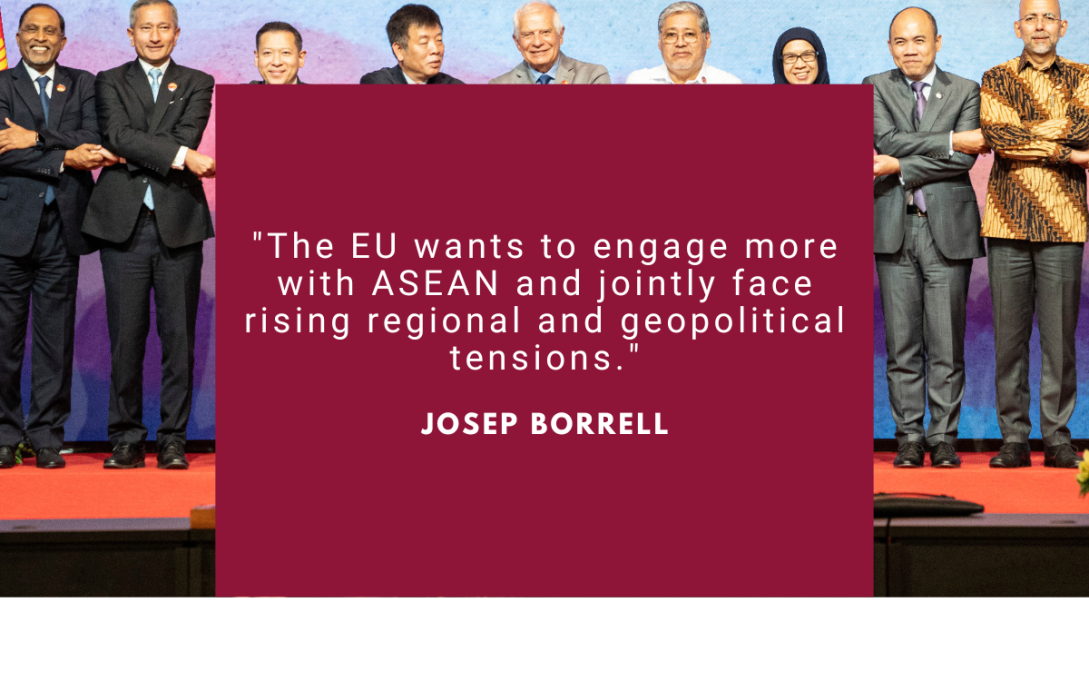The EU and ASEAN must face together rising geopolitical tensions

At the end of last week, I was in Jakarta co-chairing the ASEAN-EU Post-Ministerial Conference (PMC) (called as such because it takes place after the ASEAN Ministerial Conference) and attending the ASEAN Regional Forum (ARF).
This visit took place in an environment where Southeast Asia, the centre of the world’s economic growth, is facing with intense geopolitical dynamics, driven by the increasing US-China rivalry. This confrontation constitutes an overarching concern for Southeast Asian countries, as they face a growing polarisation and an economic and technological threat of decoupling between the two major global powers. At the same time, security tensions are on the rise in the East and South China Sea, where the deployment of assets, overlapping territorial claims, and the conduct of naval exercises create tensions between neighbours. ASEAN and China are negotiating a Code of Conduct on the South China Sea, but it seems unlikely that these talks will conclude any time soon. In parallel, the US is becoming ever more active in the region, also with a steady pattern of “freedom of navigation operations” in the South China Sea.
ASEAN is far from being a monolithic block and there are important differences between its members, not only due to their systems of governance. While some countries are historically, politically and economically close to the US, others are closer to China. However, what they have in common is that they want to avoid choosing one camp, by choosing closer integration. The key to this is also the so-called “ASEAN Centrality”: not only does ASEAN have an extraordinary convening capacity, but it also embraces a neutrality that avoids its ten members from having to make any binary choice between the two powers.
While the concerns about geopolitical rivalry and tensions in the Indo-Pacific theatre are felt everywhere in the world, Russia’s war of aggression against Ukraine is not an issue of prime concern in the region except when it comes to the price of food, energy, and fertilisers. Not all ASEAN countries voted in favour of the UN Resolutions condemning Russia and no ASEAN statement on Ukraine has been adopted for over a year. Due to its heterogeneity, the principle of consensus does not allow ASEAN naming or condemning the aggressor. There also has been no attempt to exclude Russia from ASEAN-led meetings. and most ASEAN members view Russia’s invasion through the prism of the global economic consequences and their own historic experiences. Another major internal challenge hampers ASEAN unity: Myanmar. Since the military coup over two years ago, there has been little, if any, progress in implementing the Five-Point Consensus agreed by ASEAN members and there are increasingly diverging views on how to handle Myanmar. Another crisis that is in everyone’s mind is the one caused by Democratic People’s Republic of Korea (DPRK), which does not cease to threaten the entire region with its ballistic missiles and nuclear capabilities.
The EU’s partnership with ASEAN and my visit to Jakarta
The EU and ASEAN are the two most advanced regional integration organisations in the world. They understand each other at many levels, even if some of the ASEAN members are not like our multi-party democracies. Both organisations stand together in promoting effective multilateralism, free trade, the green and digital transition and connectivity.
The EU-ASEAN relationship has enjoyed several successes in the last years (e.g. the conclusion of the Strategic Partnership, the Comprehensive Air Transport Agreement [CATA], the extensive Plan of Action 2023-2027), culminating in the Brussels EU-ASEAN Commemorative Summit in December 2022, which cemented a growing political momentum in the EU-ASEAN Strategic Partnership.
My presence in Jakarta on behalf of the EU at the two ASEAN meetings provided an opportunity to strengthen our bonds, to profile the EU as a trusted partner, to discuss regional and global developments, and to pursue our political and economic interests.
The EU-ASEAN Post-Ministerial Conference (PMC), which I co-chaired in person for the second time (last year being in Cambodia), is an annual meeting that the ASEAN Foreign Ministers hold with their Dialogue Partners (the EU is one among eleven). It is held in a 10+1 format with each one of the 11 ASEAN Dialogue Partners, and it provides an opportunity to review cooperation initiatives, and exchange views on matters of common concern. The ASEAN Regional Forum (ARF) focuses on security cooperation. The entire membership (10 ASEAN members + 17 partners) is represented and it was chaired this year by Indonesia.
In both meetings, I stressed that the EU is committed to ASEAN Centrality and aim to step up our cooperation in ASEAN-centred fora. We might be geographically distant but Europe is economically interdependent with the Indo-Pacific and we have a direct stake in each other’s security.. Reflecting the need of Europe to “de-risk” politically and economically, through diversification and closer relations with more partners in this dynamic region of the world, it is natural that our cooperation expands rapidly.
At the ARF, I focused on five global and regionalissues: the link between the climate crisis and security, the Korean Peninsula, Myanmar, Taiwan and the South China Sea, and on Russia’s military invasion of Ukraine. These topics were widely discussed and regional tensions and diverging views were clearly reflected in the focus, conduct and atmosphere of the meeting.
Like-minded partners like the US, New Zealand, Canada, Republic of Korea, Japan, and others conveyed similar messages concerning Russia’s invasion of Ukraine. Russia’s foreign minister Lavrov repeated his well-known twisted and often absurd views on the so-called root causes of his country’s attack against its neighbour. He put forward a skewed and aggressive anti-Western rhetoric portraying Russia’s ill-fated activities as actions that make the world a better and more stable place. US Secretary of State Blinken put facts straight. China was less confrontational portraying itself as the peace and prosperity-driven stabilising actor with support for concrete economic development.
Bilateral encounters
I held very constructive bilateral meetings with Asian partners, including one with China’s top foreign affairs Director Wang Yi. As my two planned missions to China in April and in June had to be postponed for health reasons on both sides, it was important that I could meet with him. The focus of our meeting was on recent developments in EU-China relations, and on how we can manage these responsibly. We exchanged extensively on what “de-risking” means and I elaborated why it is important for Europe to decrease excessive dependencies– not only towards China- but in our overall external economic relations. I also expressed the EU’s expectations as to China's role to help ending Russia's war against Ukraine. I urged Director Wang Yi to use China’s influence on Russia and to provide more humanitarian assistance to Ukraine in a visible and effective manner. We also discussed Taiwan, and I reiterated the EU’s One China policy, which means in concrete terms that we will not recognise the independency of Taiwan. preserving stability and the status quo in the Taiwan Strait is of major importance to all of us, and we need to deepen mutual engagement on common global challenges. I look forward to holding soon our Strategic Dialogue in Beijing to elaborate on these issues and prepare the next EU-China Summit.
In my other meetings with Foreign Ministers from India, Indonesia, Laos, The Philippines, Republic of Korea, Türkiye or the new ASEAN Secretary General, I could sense the strong need in preserving ASEAN as a fundamental pillar in today’s uncertain world, no matter the challenges it is confronted with, including Myanmar, DPRK, South China Sea.
I am afraid that not everyone in Europe is fully aware of the significance of the Asian Regional Forum, which would be a mistake. How often do we have Antony Blinken, Wang Yi, and Sergey Lavrov, in addition to the Foreign Ministers of Indonesia, Japan, North and South Korea, India and Pakistan and others sitting in the same room? In short, ASEAN Centrality should not be under-estimated, and we should support it if we want to be a credible player in today’s world structure.
MORE FROM THE BLOG

“A Window on the World” – by HR/VP Josep Borrell
Blog by Josep Borrell on his activities and European foreign policy. You can also find here interviews, op-eds, selected speeches and videos.
